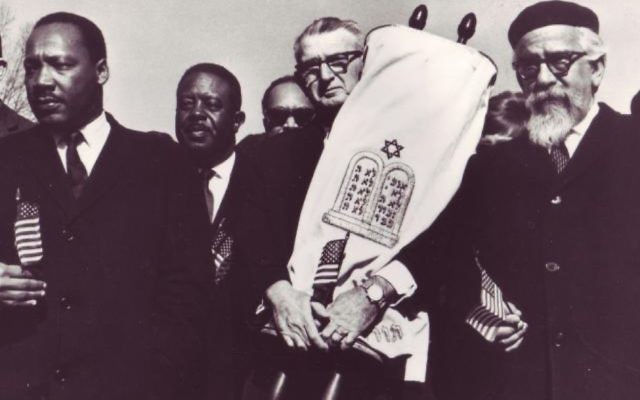MLK’s Support for Israel Clear in Letters
Using easily available primary sources should resolve any controversy.

During Attorney General Jeff Sessions’ recent confirmation hearings, Sen. Elizabeth Warren (D-Mass.) argued that Sessions’ tarnished history mattered in making a judgment about his suitability to lead the U.S. Justice Department.
To that end, Warren sought to add into the record an unflattering but accurate assessment of Sessions in a letter written by Coretta Scott King, the late widow of Martin Luther King Jr. The story of why Warren was not allowed to read the letter is, however, not our focus here.
Our focus is to look at history through primary sources, as the senator did, and recall the ties among King, Israel and the Jewish community.
February is Black History Month, a time to reflect on the stories and histories of African-Americans in the United States. King’s relationship to Zionism and Israel is one of these histories.
While activists and journalists have hotly debated whether King supported Zionism and Israel, a few primary-source letters written by King can be used to provide a clear understanding of his sentiments on the matter.
One of the most telling of these is a letter King wrote to Jewish labor activist Adolph Held on Sept. 29, 1967, months after the conclusion of the June 1967 war. Even a quick read through the letter shows King’s firm support of both Israel and the Jewish community in general.
In the first page of his four-page letter, King declares: “Serious distortions by the press have created an impression that SCLC (Southern Christian Leadership Conference) was part of a group at the Chicago Conference of New Politics (in August 1967) which introduced a resolution condemning Israel and unqualifiedly endorsing all the politics of the Arab powers. … The Black caucus modified its stand, and the convention voted to eliminate references to Zionism. … This change was the direct result of the spirited opposition on the floor by Hosea Williams, Director of Voter Registration and Political Education of SCLC. … I had no part in planning the structure or the policy of the conference, nor was I a delegate. If I had been at the conference during the discussion of the resolution, I would have made it crystal clear that I could not have supported any resolution calling for black separatism or calling for a condemnation of Israel and an unqualified endorsement of the policy of the Arab powers.”
King continues: “SCLC has repeatedly stated that the Middle East Problem embodies the related questions of security and development. Israel’s right to exist as a state of security is incontestable. … SCLC has expressly, frequently and vigorously denounced anti-Semitism and will continue to do so. It is not only that anti-Semitism is immoral — though that alone is enough. It is used to divide Negro and Jew, who effectively collaborated in the struggle for justice. It injures Negroes because it upholds the doctrine of racism which they have the greatest stake in destroying.”
Much as Warren wanted Sessions’ confirmation hearing to accurately and wholly assess his past to help decide on the present, so too it is important for the historical record to accurately show King’s stances on Israel.
The debate surrounding this issue often comes down to individuals wanting to shape their own self-serving, extra-historical narrative, rather than relying on the readily available sources that show the reality of our past — a past reality that can help navigate current struggles for justice and peace in Israel.
Eli Sperling is the Israel specialist and assistant program coordinator for the Center for Israel Education.
Further Reading
Among the primary sources available:



comments